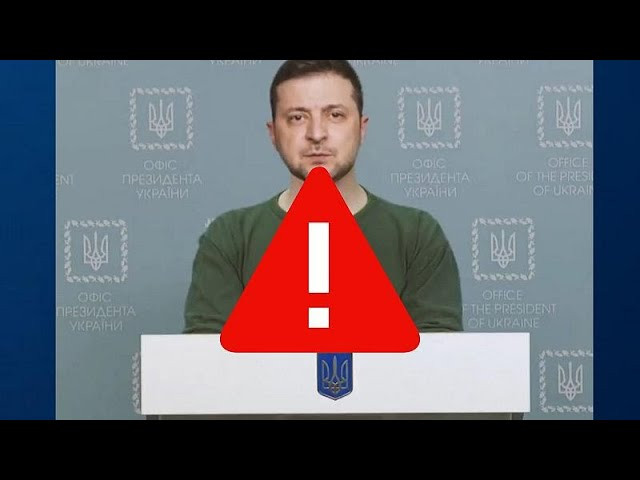Meta, Facebook's parent company, took down a deepfake video of Ukrainian President Volodymyr Zelenskyy giving a statement that he never made, calling Ukrainians to "lay down arms," on Wednesday.
As initially reported by Sky News on Wednesday, the deepfake appears to have been first posted on a Ukrainian news website for TV24 following an alleged hack. The video depicts an edited Zelenskyy standing in front of a podium, claiming that Ukraine has "decided to return Donbas" to Russia and that his country's war efforts have failed.
"It appeared on a reportedly compromised website and then started showing across the internet," Nathaniel Gleicher, who heads security policy at Meta, said in a tweet about the video. "We've quickly reviewed and removed this video for violating our policy against misleading manipulated media, and notified our peers at other platforms."
Zelenskyy's head is absurdly larger on the video than it is in real life, and it is more pixelated than the rest of his body. His fake voice is also much deeper than his true voice.
Although it is unclear who generated the deepfake, Ukrainian government officials have been warning for weeks about the likelihood of Russia disseminating faked films as part of its information warfare. This month, Ukraine's military intelligence service released a video detailing how state-sponsored deepfakes may be used to cause panic and confusion.
While the video shows a decent lip-sync, viewers quickly pointed out that Zelenskyy's accent was odd and that his head and voice did not appear authentic when examined closely.
Officials from Facebook, YouTube, and Twitter claimed the video was taken down because it violated their policies. Meanwhile, the misleading video was promoted on Russian social media.
The video's takedown shows the continued challenges that social media platforms are encountering in their efforts to combat the spread of misinformation in the aftermath of Russia's invasion of Ukraine.
Some Twitter and Facebook users have been sharing outdated video footage to make it appear as if they were filming events in real time. On TikTok, some users created fraudulent videos by using old or out-of-context audio.
Meta does not always delete false content, instead preferring to lead readers to reliable sources or identify misinformation. The social network collaborates with third-party fact-checkers to identify and correct disinformation on its services, which include the photo-and-video app Instagram.
According to Meta, it will remove misinformation if there is a risk of physical harm or if the media is particularly deceptive.
After the deepfake began to circulate on the internet, Zelenskyy debunked it in a video posted to his official Instagram account.
"As for the latest childish provocation with advice to lay down arms, I only advise that the troops of the Russian Federation lay down their arms and return home," he said. "We are at home and defending Ukraine."






